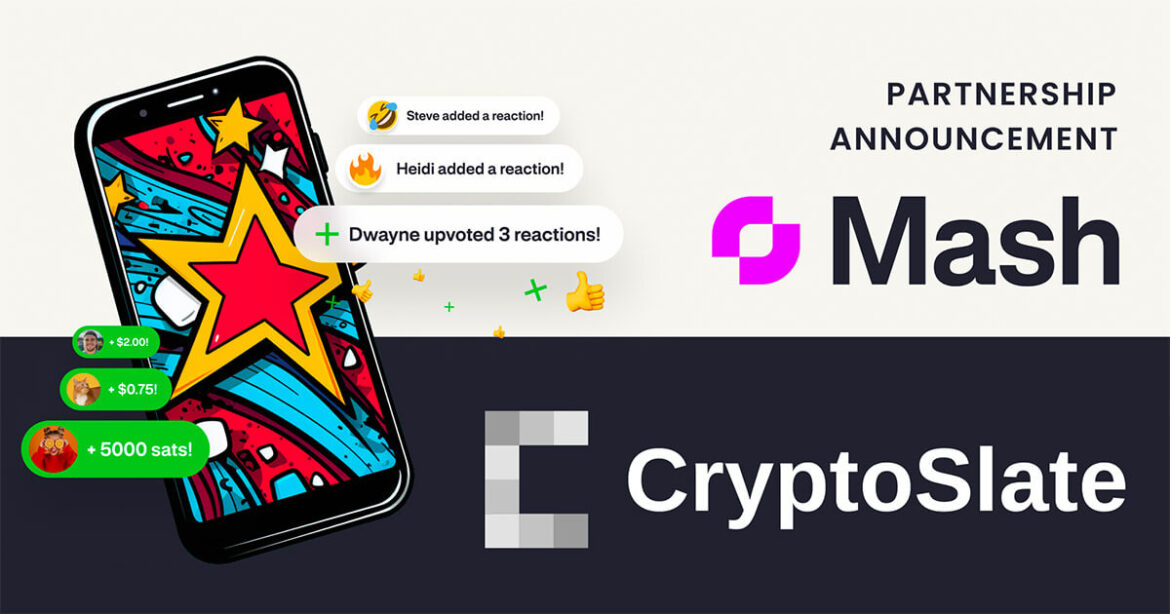
Any deal — especially one involving AI — will capture the attention of federal and state lawmakers, the Biden administration, consumer-privacy advocates and government regulators.
Source link
partnership
A partnership between privacy-focused projects Nym and Zcash was recently announced. The partnership aims to address some persisting issues in the sector to enhance user protection and data privacy in the Zcash ecosystem.
Data Leakage, A Challenging Issue
Electric Coin Company (ECC), the Zcash development organization, is collaborating with Nym, a privacy blockchain project focused on enhancing data confidentiality. The collaboration is possible through a Zcash Community Grants (ZCG) grant, as the project’s team announced on its X (former Twitter) account.
The partnership aims to address challenging user protection issues by integrating Nym’s mixnet into the Zcash ecosystem. Integrating with the Zcash light client libraries would allow the wallet developers to implement Nym mixnet’s privacy protection at their discretion.
1/6 🎉 Nym is happy to announce a grant from Zcash Community Grants to integrate the Nym mixnet with Zcash, and enhance privacy for Zcash users by protecting against metadata leaks.
— Nym (@nymproject) February 13, 2024
The goal, as the announcement explains, is for the integration process of Nym and Zcash to fill the gap in the network layer. This gap allows the metadata of user’s transactions to be traceable and leaves the data vulnerable, which then presents a privacy problem for users, as the post explains:
Powerful adversaries can analyze traffic patterns such as the stream of TCP/IP packets used to submit transactions, which can then be used to de-anonymize users. ISPs can snoop on traffic patterns to passively record Zcash activity. And the growing crypto surveillance industry can passively spy on peer-to-peer traffic, as well as conduct active attacks.
Nym will work with Zcash’s already existing privacy-preserving infrastructure to “help provide an end-to-end protected solution for users’ privacy. Zcash uses zero-knowledge proofs to secure transaction privacy, but “even advanced privacy protections like Zcash’s auto-shielding feature are vulnerable at the network later.”
The Nym mixnet is a technology that prevents government, corporate, and criminal surveillance adversaries from tracing metadata by encrypting user data into sphinx packets and dispersing them across global ‘mix nodes’, making metadata patterns untraceable and ensuring online privacy:
The mixnet achieves this by splitting data into identically sized encrypted Sphinx packets and dispersing these in three hops to ‘mix nodes’ worldwide at randomized intervals. Next, the mixnet shuffles in dummy ‘cover’ traffic, further complicating tracing. Together these features make tracking metadata patterns impossible even for powerful adversaries with a global view of the network.
A Shared Vision: Privacy For Everyone
Nym and Zcash are privacy-focused projects that protect users’ rights to their personal information and transaction data. “It is an alienable right to a dignified life free from gross intrusion and interference,” said Harry Halpin, cofounder and CEO at Nym Technologies.
Halpin also commented on the state of the digital realm regarding privacy matters. The CEO believes that although intrusion and interference are the “normal state of affairs,” a change is needed. “With this groundbreaking integration, Nym and Zcash are working to make real privacy online a reality,” he concluded.
Josh Swihart, CEO of ECC, expressed his positive outlook on the partnership, reaffirming that network-level privacy has been a “missing piece since Zcash’s inception.” He believes that privacy ecosystems coming together will only “deepen protections from everyday users to protect their financial privacy.”
Global regulators have scrutinized privacy-focused projects and accused them of enabling criminal activity. Last year, Zcash (ZEC), alongside other privacy coins like Monero (XMR), was announced to be delisted from Binance, the largest crypto exchange in the world, in four European countries. Similarly, Binance recently announced its plan to delist Moreno in the US amid regulatory pressure.

ZEC is trading at $20.71 in the hourly chart. Source: ZECUSDT on tradingview.com
Feature image from Unsplash.com, Chart from TradingView.com
Disclaimer: The article is provided for educational purposes only. It does not represent the opinions of NewsBTC on whether to buy, sell or hold any investments and naturally investing carries risks. You are advised to conduct your own research before making any investment decisions. Use information provided on this website entirely at your own risk.
On January 11, crypto exchange Coinbase unveiled its partnership with Yellow Card, the largest and first licensed Stablecoin on/off ramp on the African continent, to expand the access of their products to emerging economies across the African continent.
Expansion To Emerging Economies
Coinbase will expand access to its products through this new partnership with Yellow Card, starting with 20 African countries. They will provide millions of African users access to USD Coin (USDC) on the Coinbase Wallet and the Yellow Card app.
Both partners expect to “increase economic freedom” in many of these countries, whose economies have suffered from high inflation and remittance dependency and the lack of a modern financial system vastly sought by the younger generations. As they state in their press release:
Young people are more likely to recognize the benefits of crypto: more than seven in 10 crypto owners globally (72%) are under age 34.
Their Plan To Make The Global Financial System “More Accesible”
To achieve opening access to a more modern and global financial system, they will facilitate access to USDC on Base for cheaper fees and faster transactions than traditional transfers starting in February 2024.
In the Coinbase Wallet, users will be able to purchase USDC directly from their Wallet app, as well as sending USDC without any fee to messaging and social media apps, as they noted:
Coinbase Wallet users will be able to easily send USDC without fees on any platform where they can share a link — including messaging apps like WhatsApp, iMessage and Telegram, and through popular social media apps and email.
Users of the Yellow Card’s platform can purchase USDC on Base and transfer through the L2 blockchain, benefiting from cheaper fees and easy access to the stablecoin, too.
Chris Maurice, Co-Founder and CEO of Yellow Card, expressed his excitement in an X (formerly known as Twitter) post. Maurice is optimistic about the future of the partnership and the solutions it might bring to African people and businesses.
Beyond excited to bring @coinbase to Africa! 🎉🌍
Stablecoins like USDC solve real problems for real people & businesses on the continent.
With @yellowcard_app‘s regional expertise and Coinbase’s global brand and infrastructure, we will empower the next one billion people.
— Chris Maurice⚜️ (@chrismaurice) January 11, 2024
The partnership aims to protect users’ savings across the African continent from “unstable currencies” and economic volatility due to the high inflation rates of up to 18.5%.
They will offer lower remittance fees, with the maximum fee being 2%. As well as offering access to the global financial system to small and medium enterprises (SMEs) by allowing merchants to set up a Wallet in less than a minute and broadening their growth.
In summary, the Coinbase and Yellow Card partnership will expand solutions for people and businesses in 20 African countries by making the global financial system more accessible.

Coinbase (COIN) is currently at $132.85 on the daily chart. Source: COINUSD on Tradingview.com
Featured image from Unsplash, Chart from TradingView.com
Disclaimer: The article is provided for educational purposes only. It does not represent the opinions of NewsBTC on whether to buy, sell or hold any investments and naturally investing carries risks. You are advised to conduct your own research before making any investment decisions. Use information provided on this website entirely at your own risk.
Amid the current bearish sentiment around the cryptocurrency market, the popular Ethereum-based meme coin Shiba Inu has taken a positive step by partnering with internet domain company D3 Global.
Significance Of Shiba Inu’s Partnership With D3 Global
The team revealed its partnership with the internet domain name company in its latest version of the SHIB magazine. The latest magazine is now the seventh version that has been released since it was introduced.
D3 Global is a domain company that focuses on bridging the gaps between the web2 and web3 ecosystem which is overseen by Fred Hsu and Shayan Rostam.
Rostam asserted that partnering with Shiba Inu will allow the introduction of unique, memorable, and affordable domain names to users. Additionally, it will make use of Web3 utility on the internet’s base layer to streamline their digital identities.
The latest partnership is a part of Shiba Inu’s broader endeavor toward a decentralized identification project. Shiba Inu is seeking to establish a decentralized internet top-level domain (TLD) name for its users.
The collaboration aims to safeguard the “.shib” TLD name. A TLD is the last element of a web address that appears after the dot such as “.com,” “.org,” or “.net.”
The TLD will enable SHIB users to register their .shib names which may be resolved through the global Domain Name System (DNS). It will also allow its users to have a digital identity compatible with Web2 and Web3 applications.
The “.shib” domain seeks to offer seamless compatibility with both the traditional Web3 technologies and the modern internet’s Domain Name System (DNS). This is unlike the current web3 names which are incompatible natively with essential internet technologies like email and web browsers.
With this initiative, SHIB users may have more functionality and be able to utilize their domain with regular web browsers. Additionally, it could also improve their blockchain transactions and digital identity.
Process Of Acquiring A New TLD
Being a major player in the internet domain industry, D3 is an expert in the administration and use of top-level domains. Their specialty is maneuvering through the difficult procedure of obtaining and configuring new TLDs.
The procedure of getting a TLD is not that simple or quick. It needs to be approved by ICANN, which is the result of a difficult and extensive application procedure.
Related Reading: Shiba Inu Faces Make Or A Point As Analyst Identifies Critical Trading Pattern
In addition, the community must be involved and supportive of the initiative. This is because ICANN takes the public interest and possible effects of a new TLD into account.
Despite the notable partnership, the SHIB token is still down by over 2% in the past 24 hours, trading at $0.000010. Its market capitalization is down by over 2%, while its trading volume is down by over 30%, according to CoinMarketCap.
So far, the lead developer of Shiba Inu, Shytoshi Kusama has expressed the team’s pleasure in the collaboration. “We are extremely proud to once again trailblaze decentralization in world history,” Kusama stated.
Featured image from iStock, chart from Tradingview.com
Disclaimer: The article is provided for educational purposes only. It does not represent the opinions of NewsBTC on whether to buy, sell or hold any investments and naturally investing carries risks. You are advised to conduct your own research before making any investment decisions. Use information provided on this website entirely at your own risk.

CryptoSlate is excited to announce our partnership with Mash, introducing an innovative way for readers to engage with our content using Satoshi (SATs), fractions of Bitcoin. This partnership marks a significant step in enhancing our website’s interactivity and supporting independent journalism.
Introducing Mash reactions on CryptoSlate
We have integrated Mash’s revolutionary tool on our website, offering a dynamic way for you to interact with our articles. As you read through our content, you can now react to specific parts of an article using a range of emojis. Each page offers 10 free emoji reactions for early readers, adding a layer of excitement and immediacy to the reading experience.
For those looking for extra flair, premium reactions are available for a few SATs, which goes toward supporting the team. These include unique GIFs and animations, like the question mark feature that playfully interacts with the text. All of these interactions are then available for all readers to see so you can show off your support and perspective on the news we cover.
Watch the demo below!
Importantly, the animations are only shown once when the page loads, so it doesn’t disrupt your reading experience. Our journalists have thoroughly enjoyed testing these features in beta, and we’re confident you will, too.
Linking your Lightning wallet to the Mash wallet is straightforward. Once connected, you can interact seamlessly with our website, enhancing your reading experience with real-time reactions.
Why the Lightning network?
The Bitcoin Lightning Network represents a remarkable innovation in the crypto payment space, especially for microtransactions. Its core strength lies in its ability to facilitate instant, extremely low-cost transactions, a significant enhancement over traditional Bitcoin transactions.
By operating off the main Bitcoin blockchain, the Lightning Network circumvents the scalability issues that often lead to congestion and high fees on the main chain. This off-chain approach means transactions can be processed almost instantly, regardless of the network load.
For microtransactions, this is particularly groundbreaking. Traditional blockchain fees can often exceed the transaction value itself, but the Lightning Network’s minimal fees make even tiny transactions economically viable.
This opens up new avenues for small-scale transactions that were previously impractical, such as tipping content creators or paying for low-cost digital services. Furthermore, its scalability and efficiency make it an attractive option for businesses and individuals alike, fostering a more inclusive and efficient crypto ecosystem.
A new way to support independent journalism
At CryptoSlate, we pride ourselves on providing unbiased, fair, and neutral journalism. The integration of Mash allows you to support our mission directly. By interacting with our content using SATs, you contribute to our independence, helping us stay free from an overreliance on advertisers.
This launch is just the beginning of our long-term partnership with Mash. We plan to introduce more engaging features that support Bitcoin and enhance your interaction with CryptoSlate.
To celebrate this launch, we’re conducting some unique giveaways in the coming weeks. Participants will receive SATS through their Mash wallets to try out these exciting features free of charge. The speed and reliability of these transactions, as experienced by our journalists, are truly impressive, and the Bitcoin lightning network is the ultimate evolution of payments.
Your engagement and support through Mash enrich your experience on our platform and empower us to continue delivering top-notch, unbiased journalism. So, dive into any article on CryptoSlate, try out the Mash features, and become a part of our vibrant, interactive community.
Global financial firm Circle has announced a strategic partnership with the Japanese financial services SBI Holdings, Inc., to promote the adoption of Circle’s USDC stablecoin and web3 services in Japan.
Circle Joins SBI Holdings In A Memorandum Of Understanding
According to the announcement, both parties have signed a Memorandum of Understanding (MOU) toward promoting UDSC‘s adoption in the country. Due to this, both parties are also committed to accurately abiding by stablecoin-related regulations and communication with authorities.
The announcement read:
The companies have signed an MOU underpinning the work ahead, which includes SBI Group and Circle initially working towards the circulation of USDC and expanding the use of stablecoins in Japan. SBI Group and Circle have also committed to properly complying with stablecoin-related regulations, including communication with authorities.
Circle’s partnership with SBI Holdings comes amid the Japanese government’s goal of encouraging the expansion of the Web3 business and enacting new stablecoin rules. In June, Japan’s updated Payment Services Act was published, emphasizing stablecoin regulation.
The Revised Payment Service Act focuses on stablecoin issuance and circulation in Japan as it moves toward a Web3 economy.
As a global leader in the digital asset economy, the Japanese government revised the Payment Services Act (the Revised Payment Services Act), on June 3, 2023, to establish regulations for stablecoins. The regulation is expected to stimulate the issuance and circulation of stablecoins in Japan and advance Japan’s transition towards a Web3 economy.
Furthermore, it creates “collateralized” stablecoins that are backed by legal tender. This way, Circle’s USDC goes a step further because it is backed 100% by highly liquid cash and cash-equivalent assets and is always convertible 1 to 1 for US dollars.
The announcement also highlighted a banking relationship between Circle and SBI Shinsei Bank. This is because the SBI Shinsei bank will provide banking services to the firm. As a result of this, USDC and liquidity become accessible for users and businesses in Japan.
Furthermore, SBI Group will embrace Circle’s Web3 Services solutions into its digital asset portfolio strategy. These include Programmable Wallet, smart contract management tools, and blockchain infrastructure.
The Company’s CEO On The Partnership
Circle’s Chief Executive Officer (CEO) Jeremy Allaire has expressed his pleasure in the recent collaboration with SBI Holdings. The CEO has taken to X (formerly Twitter) to share his optimism on the partnership.
According to him, the partnership exhibits a shared vision for digital currency’s future. The partnership also marks a significant milestone for Circle, as it plans to expand in Japan and Asia Pacific.
Allaire stated:
Our partnership with SBI Holdings represents a shared vision for the future of digital currency and is a significant milestone in Circle’s expansion plans in Japan and the Asia Pacific. We are excited to collaborate with SBI towards setting new standards in the financial sector in Japan.
So far, SBI Holdings is requesting registration as an electronic payment instruments service, as this is subject to approval by the authorities.
Featured image from Binance, chart by Tradingview.com
Microsoft enters $100M partnership with Canadian firm after quantum breakthrough

Canadian quantum computing firm Photonic has emerged from stealth to raise $100 million for its all-silicon quantum computing platform. Among the investors is new partner Microsoft, which will co-develop quantum networking solutions with the startup.
The investment and partnership come as numerous experts in the industry laud Photonic’s novel approach to quantum computing as a “breakthrough” for the field.
We’re joining forces with @TeamPhotonic to enable future quantum networking over long distances—and to integrate Photonic’s scalable quantum computing offering into Azure Quantum Elements. Learn more: #AzureQuantum
— Azure Quantum (@MSFTQuantum) November 9, 2023
Photonic’s technique involves building quantum computers using silicon spin qubits with a spin-photon interface — in other words, a computer that uses qubits made of light to perform quantum computations on silicon hardware.
Related: IBM, Microsoft, others form post-quantum cryptography coalition
In quantum computing, a qubit is analogous to a binary computer’s bits. However, while a binary, or classical, computer can only perform calculations using ones and zeros, a qubit can tap into exotic features of quantum physics called “superposition” and “entanglement.” These quantum states allow qubits to compute in a way that would resemble a binary bit being able to use ones, zeros, ones and zeros, neither ones nor zeros, and other even less intuitive combinations.
A spin qubit takes things a step further by adding electron spin. And by developing a qubit with a photonic spin interface in an all-silicon hardware solution, Photonic believes it has found the missing piece of the puzzle when it comes to quantum computing.
Stephanie Simmons, founder and chief quantum officer of Photonic, said the company expects to bring a fault-tolerant, fully functional quantum networking system to market as early as within the next five years.
Per Simmons, the partnership with Microsoft will help to facilitate that timeline:
“We’re incredibly excited to be partnering with Microsoft to bring forth these new quantum capabilities. Their extensive global infrastructure, proven platforms, and the remarkable scale of the Azure cloud make them the ideal partner to unleash the transformative potential of quantum computing and accelerate innovation across the quantum computing ecosystem.”
Immutable to offer studios up to $100k to build web3 games in partnership with Amazon AWS

In a potentially significant step towards mainstream blockchain-enabled gaming adoption, Immutable, the blockchain gaming platform, secured a strategic partnership with Amazon Web Services (AWS), according to the company’s recent announcement.
By joining forces with AWS, Immutable aims to leverage Amazon’s expansive network of game studio leads, thereby facilitating successful deal closures. In turn, game developers and studios will gain access to a comprehensive platform and ecosystem in web3 gaming.
Some promising games built on the Immutable X layer-2 blockchain include Gods Unchained, Guild of Guardians, Illuvium, Ember Sword, Blankos Block Party, Planet Quest, and GreenPark Sports. The company has also had extensive partnerships with top media companies such as Warner Bros to offer other blockchain-enabled interactive experiences.
Immutable offering AWS credits for web3 games.
Immutable’s inclusion in Amazon’s ISV Accelerate Program is vital to this partnership, a co-selling initiative for organizations offering software solutions that operate on or integrate with AWS. This program enables Immutable to tap into AWS’s expert resources, strategically aimed at securing prospective customers and closing deals with prominent global game studios.
Further, Immutable will provide game studios with up to $100,000 in AWS cloud credits to help cover the costs of using AWS cloud services for the studios.
“Immutable is able to provide AWS cloud credits to game studios through AWS Activate, which offers Immutable customers up to $100k to cover cloud services.”
This strategic alignment positions Immutable at a unique vantage point to transform the gaming landscape. The platform’s ecosystem, already bustling with game studios and players, is further bolstered with the necessary infrastructure components and ecosystem partners to create a secure and dependable environment.
Immutable and AWS’s partnership is seemingly underpinned by a shared belief that blockchain technology can revolutionize the gaming industry by melding top-tier gaming technology with true digital asset ownership.
“We are also working on go-to-market programs to accelerate the onboarding of game studios to web3 and drive digital ownership to millions of gamers globally.”
Immutable’s ongoing collaboration with AWS, rooted in security, performance, proximity to users, and elasticity for developer environments, has created a serverless architecture, enabling the platform to scale effectively amid rapid growth.
Furthermore, Immutable has reported the ability to handle a tenfold increase in partnered games, signifying a marked improvement in the customer experience, anchored by increased security and over 99% uptime.
John Kearney, Head of Startups at Amazon Web Services, Australia and New Zealand, noted,
“Today, web3 gaming is one of the fastest-growing sub-sectors of the blockchain industry and is already enjoyed by millions of gamers worldwide.”
He added that AWS is “supercharging Immutable’s development by onboarding new game studios and providing them with resources through our flagship AWS Activate startup program and AWS’s ISV Accelerate Program, which give them the tools to accelerate their global launch.”
Looking forward: Immutable and Amazon.
Moving forward, Immutable plans to continue investing in its infrastructure, built on AWS, to support its upcoming offerings, such as Immutable zkEVM, effectively. With Ethereum compatibility, Immutable zkEVM aims to expand offerings and support to partners, enabling more developers to build web3 games without learning a new programming language.
Immutable is positioning itself as a one-stop-shop for game developers, providing all the necessary tools to build a successful web3 game. From player experience enhancements like Immutable Passport for instant wallet onboarding to revenue engines like Immutable Global Orderbook & Marketplace Network for maximizing asset distribution, Immutable offers a suite of integrated products for platform services hosted on AWS.
Peloton (PTON) Shares Jump 15% on Content and Apparel Partnership with Athletic Clothing Retailer Lululemon
Both Peloton and Lululemon will partner for 5 years as they hope to exchange benefits to help support the exercise and athletics businesses.
American exercise equipment and media company Peloton Interactive Inc (NASDAQ: PTON) has partnered with Canadian athletic apparel retailer Lululemon Athletica Inc (NASDAQ: LULU). The two companies have officially entered a partnership that will last five years and introduce Peloton content to Lululemon’s app. In exchange, Lululemon will be the primary athletic apparel partner for Peloton. Furthermore, the deal will also make some Peloton instructors Lululemon ambassadors.
In response to the announcement, Peloton stock rose by more than 15% in after-hours trading. As of writing time, PTON is at $5.39, nearly 16% above its $4.65 close. Unfortunately, Lululemon shares did not share the same rise. LULU only climbed 0.03% to $379.25 from its $379.14 close.
Lululemon and Peloton Reached Deal for Both Companies to Access Exchanged Benefits
Neither party has disclosed shared revenue or any other specific terms of the deal. However, Lululemon says it will no longer sell Mirror, a product that allows users to stream live and on-demand workout videos. Although the company plans to continue providing support for existing Mirror owners, Lululemon will discontinue support for new users at the end of this year.
Paying users of the Lululemon Studio app and Mirror will gain access to thousands of Peloton videos, while non-paying users will only access a limited amount of content. Also, as part of their partnership, both companies will host in-person community events.
In addition, the deal will see Lululemon stopping production of its own exercise videos, along with any third-party content.
Suspending its Mirror business is not news as the company was reportedly considering selling the unit. This happened after Lululemon’s hardware sales missed projections, causing the firm to take impairment charges worth $443 million in fiscal Q4 2022.
Both companies seem to focus heavily on content production since sales of physical fitness products have tanked. In a statement, a Lululemon representative said:
“…we are shifting the focus of Lululemon Studio from a hardware-centric offering to one that is also focused on digital app-based services going forward. This work is underway, and our strategy will enable us to create long-term value and build a larger community of guests with a deeper connection to Lululemon.”
Peloton Stock
Peloton stock has had a poor year, recording a 25.48% loss over the last month, and over 36% in three months. Year to date (YTD), PTON has lost 41% and 43.57% over the last year. On the other hand, Lululemon has fared a little better. The company only gained 0.64% and 0.77% in the last 1 month and 3 months, respectively. However, LULU has risen 22.56% in 1 year, and more than 18% YTD.
Last month, Coinspeaker reported that Peloton stock crashed about 30% in premarket trading after the company posted poor figures for fiscal Q4 2023. Peloton’s loss per share did not meet expectations as it recorded 68 cents, over the 38 cents analysts polled by Refinitiv expected. The company also announced a sales loss of 5.3%, to $642.1 million from 678.7 million.
next
Business News, Deals News, Investors News, Market News, News

Tolu is a cryptocurrency and blockchain enthusiast based in Lagos. He likes to demystify crypto stories to the bare basics so that anyone anywhere can understand without too much background knowledge.
When he’s not neck-deep in crypto stories, Tolu enjoys music, loves to sing and is an avid movie lover.
You have successfully joined our subscriber list.
After more than a decade of rapid cloud-computing growth, 2023 has finally been the year the industry has slowed a bit. Companies are in cash conservation mode, and they’re finding far less use for new subscription-software services than in the recent past.
But one theme has been resilient: artificial intelligence (AI). Or put more simply, automation. With the economic slowdown and high inflation pinching budgets, companies are looking for ways to do more with less. As a result, ServiceNow (NOW 0.35%) has bucked the slowdown many cloud software companies have been reporting, and a new partnership with Nvidia (NVDA -1.71%) announced earlier this year could help sustain the company’s lead.
A full-blown automation platform
ServiceNow provides a software-based platform for businesses to digitize their workflows. Be it technology, employee, or customer-facing tasks, ServiceNow helps integrate data across an organization to uncover inefficiencies and help its customers delete or automate these inefficiencies to boost productivity.
In other words, ServiceNow’s software is designed to increase profit margins for its customers. If ever there was a software suite ideal for the 2023 economy, it might be this one.
Earlier this year, ServiceNow said it would be integrating Nvidia’s new AI chips and AI training software to help make its platform even more efficient. In turn, Nvidia would use the resulting ServiceNow AI products to flatten any bumps in its own research and development operations.
More recently, ServiceNow, Nvidia, and tech professional services giant Accenture expanded previous partnerships to create AI Lighthouse, a comprehensive computing product that will help early adopters find and develop uses for generative AI (read: even more automation and cost savings).
ServiceNow sails through the cloud slowdown
There’s no better proof of the value that ServiceNow customers are getting than in the software company’s financial results. In the second quarter, subscription revenue increased 25% year over year to nearly $2.1 billion. The outlook for full-year subscription revenue growth was also increased to at least 25.5% over 2022, or about $8.6 billion.
For the record, full-year 2022 subscription revenue grew 24%, so ServiceNow expects that to accelerate in 2023, a testament to the platform’s power to help customers fight against fears of an economic slowdown. Many subscription-software peers have been reporting a significant cool-off in their revenue growth this year as customers tighten up their budgets.
ServiceNow has also been profitable on a free-cash-flow basis for some time. And now, net income under generally accepted accounting principles (GAAP) is rapidly increasing and narrowing the gap between the two metrics. Employee stock-based compensation, or SBC, is the primary reason for the difference between the two, but free-cash-flow profit margin, which excludes SBC, is expected to be a very healthy 30% this year.
Data by YCharts. TTM = trailing 12 months.
Is the stock a buy?
As with other software companies (like what Snowflake recently reported), the installation of new hardware and AI software from the likes of Nvidia will take time to flow through to ServiceNow’s financials. Perhaps by calendar 2024, the company will start revealing customer success stories from its new generative AI products.
No matter, though. ServiceNow is still making hay without the new AI partnerships. The stock trades for a premium 50 times trailing-12-month free cash flow, but deservedly so, considering the steady and profitable growth that this top-notch cloud software business has been reporting for years.
More profitable growth is management’s forecast for the foreseeable future. For investors looking for the best software stocks to invest in right now, ServiceNow ranks as a solid option as a dollar-cost averaging candidate.
Nicholas Rossolillo and his clients have positions in Nvidia. The Motley Fool has positions in and recommends Accenture Plc, Nvidia, ServiceNow, and Snowflake. The Motley Fool recommends the following options: long January 2025 $290 calls on Accenture Plc and short January 2025 $310 calls on Accenture Plc. The Motley Fool has a disclosure policy.











